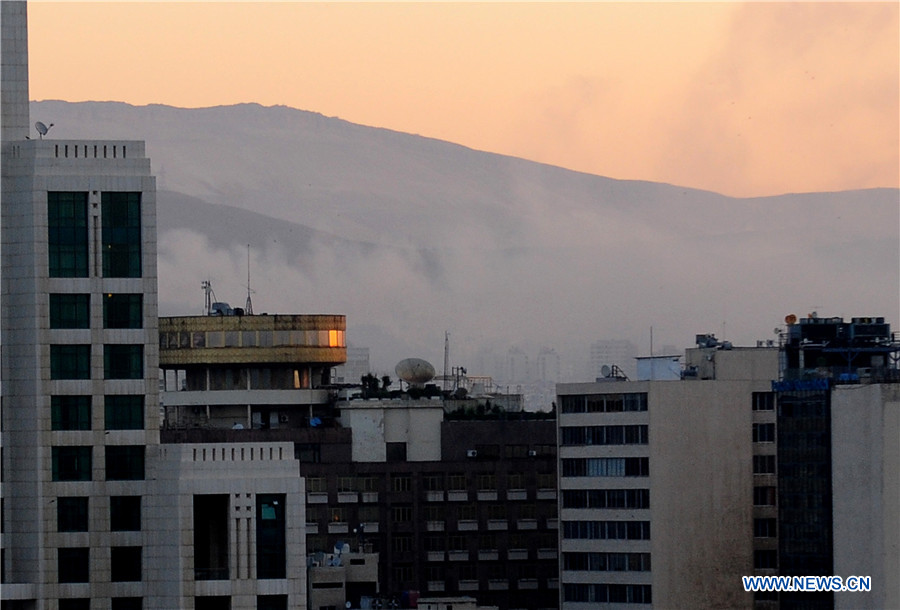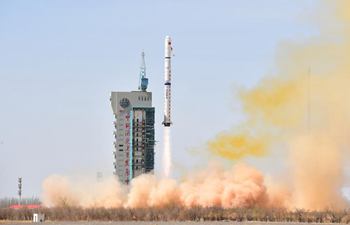
Smoke is seen from a distance in the Syrian capital Damascus on April 14, 2018. The U.S. started military actions against Damascus before daybreak Saturday as loud explosions were heard with "red dots" seen flying from earth to the sky, reported Syrian state TV and Xinhua reporters in Damascus. (Xinhua/Ammar Safarjalani)
by Xinhua writer Tian Dongdong
BRUSSELS, April 14 (Xinhua) -- It is disgraceful to stumble twice over the same stone. But on the issue of taking military action in the Middle East, some Western countries, led by the United States, are apparently suffering from amnesia.
U.S. President Donald Trump on Friday ordered in Washington "precision strikes" on Syria, in coordination with Britain and France, as a response to last weekend's chemical attack "highly likely" launched by Syrian troops in the rebel-held Douma district on the outskirts of Syrian capital Damascus.
However, the Syrian government, Russia and Iran have lashed out at the unfounded accusation of the United States and its allies, warning that the strikes "will not be left without consequences."
Without an authoritative and fair investigation by international bodies like the Organization for the Prohibition of Chemical Weapons (OPCW), any conclusion about who is responsible seems to be rash and not very convincing.
The danger of a full-blown military escalation and inability to reach a compromise over the establishment of an accountability mechanism will only inflict tremendous suffering on innocent Syrian people.
This cannot help but evoke the bitter fact that before the outbreak of the Iraq war in 2003, the administrations of George W. Bush and Tony Blair asserted that Saddam Hussein hid large stockpiles of weapons of mass destruction inside Iraq.
However, the so-called conclusive evidence proved to be hollow at best after the war, which had claimed the lives of nearly 4,500 U.S. military officers and over 100,000 Iraqis by the time the American troops were formally withdrawn from Iraq eight years later.
Unfortunately, this disgraceful episode appears to be selectively forgotten by those countries when they put the Syrian government in the crosshairs.
The heavy cost of military interventions in the Middle East slipped from their memory, too.
In the names of fighting terrorism, building democracy and restoring perpetual peace in the region, the United States and its allies had launched several military actions in Afghanistan, Iraq, Libya and Syria since the 9/11 terrorist attacks.
Sadly, in a rush to open the Pandora's box, they failed to recapture the devil in the region. Facts have proven that apart from overthrowing the Taliban government in Afghanistan, as well as the ouster of Iraq's Saddam Hussein and Libya's Muammar Gaddafi, none of the other war goals advocated by Washington and its allies was fulfilled.
On the other hand, the wars cost them dearly too. Apart from the loss of trillions of dollars and thousands of fresh lives, the refugee crisis, which is a direct result of the Western interventionism, has troubled the belligerent Western countries.
Since the outbreak of the civil war in Syria in 2011, over 4 million Syrian refugees have fled abroad, causing the worst refugee crisis in the modern history of Europe. Like a catalyst, the refugee crisis has amplified the religious and cultural conflicts in the European society, allowing populist and Eurosceptic parties to rise.
Since Washington, London and Paris launched a new round of military action against Syria, the risk of deteriorating the current crisis runs high.
Given Syria's complex and sensitive geopolitical environment, Western military intervention would also cause a new chain reaction in the Middle East. It is high time for them to wake up and recall the past painful lessons.















